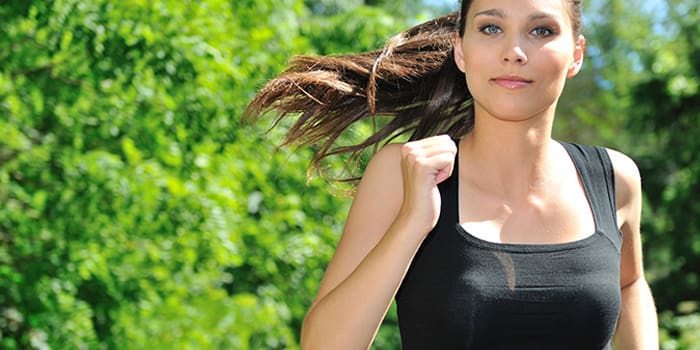Ask the Expert: Do I Have to Sweat to Get a Good Workout?

Is sweating a must when working out? What happens if I do a good lifting session but don’t sweat? Does it mean I didn’t exercise enough?—Monica Q.
The Short Answer
No, you don’t need to sweat to have a good workout. It can serve as one indicator of how intense your workout was, but there are better indicators including heart rate or perceived exertion (how hard it feels). In other words, if you bust your butt, it was probably a good workout, even if you’re dry as a bone afterwards.
Conversely, just because you’re sweating buckets doesn’t mean you had a great workout. It might just mean you were really hot. Again, it’s better to go by how hard you worked, not how wet your shirt is.
The Long Answer
You sweat to regulate body temperature. When you get too hot, your glands release a water-and-electrolyte solution across your skin’s surface. The result is that your skin cools, causing a chain reaction of temperature reduction that ultimately reduces your core temperature.
You have two kinds of sweat glands: eccrine and apocrine. Apocrine glands are located in all the nooks and crannies like your armpits and groin. Better known as “flop sweat,” this kind of perspiration is emotionally activated, such as when you’re nervous, stressed, or turned on. In addition to water and minerals, the apocrine glands secrete a cocktail of proteins, fats, and steroids that is broken down by bacteria, creating an offensive odor.
The second kind of sweat gland is the eccrine. These are located all over your body and they’re the ones that do all the work when you exercise. You have between two and four million of them. The reason workout sweat smells so much better than first date sweat is that eccrine glands don’t secrete the bacteria-feeding cocktail, just water and minerals, primarily sodium with a little potassium, calcium, and magnesium (all electrolytes) with a tiny bit of trace minerals.
There are a few reasons you might not be sweating the way you think you should. First, two to four million is a wide range. You may just not have as many sweat glands as that Drippy McDrenchalot going all Niagara Falls on the stationary bike in your spin class. Genetics, fitness level, weight, and outside temperature also play a role. If the air is cool, it’s going to keep you cool to some degree, so you’ll sweat less. However, if it’s extremely hot, your sweat may evaporate as fast as you generate it, especially if you’re wearing moisture-wicking clothes. It’s common for cyclists, triathletes, or marathoners to finish events only to find their gear is completely dry, yet covered in salt—residue left from evaporated perspiration.
Your fitness level can also decrease or increase perspiration. On one hand, fit people have more efficient engines, so they start sweating earlier. It sounds contradictory, but the reason for this is that a properly cooled engine can work harder and longer, so it’s just a body’s way of prepping for what it’s good at.
However, especially in the case of many Beachbody® customers, significant weight loss often accompanies increased fitness. Overweight people tend to sweat more, because they have weight to support and more mass to cool down, therefore they work harder. So when you’re dropping some serious el-bees, even though your fitness is improving, you may sweat less because it’s easier for your body to do everything.
If you never sweat at all, there’s a slim chance you suffer from a condition called anhidrosis, but odds are you’d know it already and you’d experience other symptoms when you work out such as dizziness, flushing, nausea, or passing out. However, if you’re concerned, you should speak with your medical professional.
If you’re numbers-oriented, you might want to try a heart rate monitor (HRM) to determine if you’re pushing hard enough. Here’s a great article from Steve Edwards explaining how to do that. However, while I certainly use a HRM as a performance indicator for training, when it comes to getting a good ol’ fashion workout, I prefer to let perceived exertion be my guide. If it hurts, it’s happenin’. (Within safe limits, of course. I’m not advocating heart attacks here.)
If you’ve just started a program and you’re not sweating or feeling especially spent, it could be that you’re still mastering the moves. That’s okay. But if you’re a few weeks into it and you’re not feeling the burn, odds are that you’re not pushing hard enough whether you’re sweating or not.
